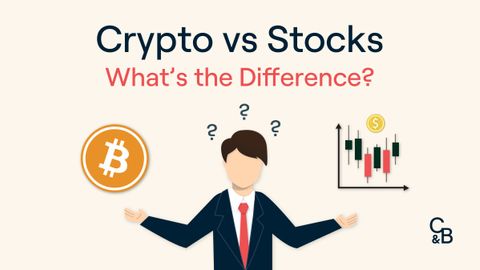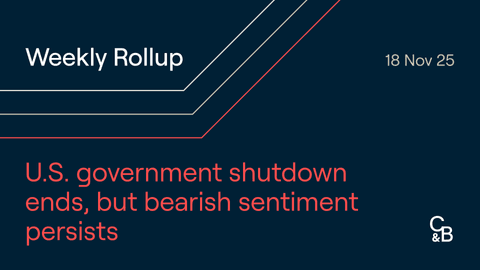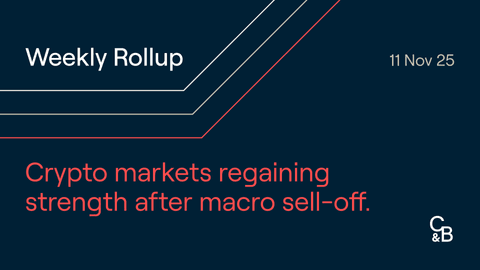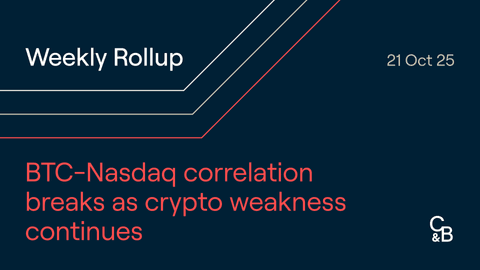Key Points
- Stocks are a long-established asset class used as a vehicle for making profit. They also give the holder partial ownership over the company and in some cases, any future earnings/losses. Stocks can only be traded during set market hours.
- Cryptocurrency is a newer asset class that leverages blockchain technology to verify and secure transactions. These digital currencies are usually attached to projects attempting to deliver utility or value. Crypto is borderless and can be traded 24/7 without the need of an exchange or intermediary party.
- Both crypto and stocks are susceptible to price volatility.
- Crypto and stock markets have a diversity of assets available for trade, with leading crypto assets tending to have both real-world and Web3 utility.
What is Cryptocurrency?
Cryptocurrencies are digital currencies powered by blockchain technology. This technology works to verify and secure transactions. Most cryptocurrencies run on decentralised networks, meaning they’re not subject to centralised or direct government control.
Bitcoin is usually the first thing that comes to mind when people think of crypto. Created in 2009, Bitcoin is the first and most well-known crypto. Since its release, tens of thousands of other coins have followed in its footsteps. These iterative currencies are often referred to as altcoins, short for “alternative coins”.
In most cases, these digital currencies are linked to a specific project attempting to deliver utility or value. For example, Ether (ETH)—the crypto that is native to the Ethereum blockchain—is essential for facilitating transactions and the creation and use of various applications across the network. Other examples of crypto include Solana, Cardano, and Tether.
What is a Stock?
A stock is a type of financial instrument known as a security. Stocks are usually equity or hybrid securities, giving the stockholder some form of ownership in a corporation. It also represents partial ownership of the company’s assets and future earnings. Publicly listed companies usually have their stock available for trading on exchanges, like NASDAQ, allowing investors to buy, sell, or trade shares in the company.
Stocks fall under two main categories: common and preferred.
Common stock is what most people think of when they think of stocks. Owners of common stock can cast a vote on corporate matters. Their voting power is usually proportionate to the amount of stock they own. Common stock owners also share a portion of the company’s profits and/or losses, and can receive dividends in certain circumstances.
Owners of preferred stock do not have voting rights. If the corporation goes into liquidation though, these shareholders will be the first to receive dividends and/or company assets.
A simple formula can be used to determine the value of a company’s stock: Number of Shares x Current Share Price = Stock Value
Crypto vs Stocks: The Key Differences
Investors use both crypto and stocks as investment vehicles for generating wealth. But there are some key differences between both forms of investing.
Although some crypto projects offer voting rights in the form of a governance token, or operate as a decentralised autonomous organisation (DAO), investing in crypto doesn’t mean you have partial ownership of a project. Crypto projects also do not offer dividends. Instead, one can lend or stake their crypto for passive income. Staking crypto over a period of time will net the investor a return equal to the yield offered by the platform or service they use.
Lastly, crypto markets never sleep. Unlike traditional markets that trade between set hours on a Monday-Friday schedule, such as the NYSE, the crypto market is always live for trading. Some exchanges around the world have limited open hours on the weekend, but it’s very uncommon.
Pros & Cons of Investing in Crypto
Pros
- Decentralised: Crypto is appealing to some investors because many projects are decentralised. These projects cannot be controlled by centralised authorities like governments, financial institutions, single individuals, or organisations. Although governments can create laws to regulate crypto, it is resistant to censorship. Control is distributed, not concentrated.
- High Growth Potential: With assets like Bitcoin growing over 9,000,000% in value in the last decade, it's hard to ignore the growth potential within crypto markets. It’s not uncommon to see a crypto significantly grow in value within days (or less). This high growth potential may be attractive to some investors looking to profit in the short term.
- Globally Accessible: Anyone with an internet connection can access crypto. It is a borderless market designed to operate without the need for third-party merchants or any other intermediaries.
- Liquidity: Cryptocurrencies are also especially liquid. Popular crypto assets can be easily traded for other coins or cash, and investors can easily exit the market and convert their crypto into cash.
- Inflation-Resistant/Deflationary: With no central bank controlling the supply and monetary policy, some crypto assets are seen as a hedge against inflation. Bitcoin is widely considered to be inflation resistant due to its automated systems that regulate total supply and scarcity. This helps to ensure the future purchasing power of the asset.
However, cryptocurrencies are not all the same, so it’s important to consider the issuance rate and supply of each crypto asset.
- Lending, Staking and Mining: Crypto investors aren’t limited to holding their assets. On PoS networks, they can stake their coins, earning passive income for providing liquidity to the network. Through decentralised finance (DeFi), investors can also loan their crypto and potentially earn interest. On Proof of Work (PoW) networks, they can also mine crypto for rewards.
- Asset Diversity: There are well over 20,000 different types of crypto in the market. A look at the top 20 assets by market cap displays a depth of diversity in types of crypto and their use cases. There is likely a crypto for everyone including one (or more) that you may be interested in.
Cons
- Volatility: It’s no secret that crypto markets are highly volatile. Significant price swings that would be considered major events in traditional financial markets are a regular occurrence in the world of crypto. The potential for quick gains can be very attractive to new investors. However, they should be aware that its flipside is the potential for equally dramatic losses.
- Lack of Regulation: The crypto market is not comprehensively and clearly regulated by any government agency, like traditional financial markets. The unique digital and decentralised characteristics of cryptocurrencies present a major challenge for regulators globally. Lack of regulation also means that the market is prone to scams from anonymous bad actors.
- Custody Risks: If you choose to self-custody your assets, once you lose access to your wallet, your assets are gone forever. Self-custody is done to keep a network secure and can reduce the possibility of hackers stealing personal funds. But if investors lose their physical wallet, key, or seed phrase, their crypto is essentially gone.
Caleb & Brown works around self-custody concerns by providing custody for all our clients. You’ll never have to worry about losing a password again. Our brokerage is also backed by industry-standard security through Fireblocks™
- Returns Not Guaranteed: As with any investment, there will always be some level of risk involved. You may be able to negate your risk by applying certain investment strategies. The past performance of an asset is never an indicator of future performance.
Pros & Cons of Investing in Stocks
Pros
- Regulated: Stocks are heavily regulated in most countries around the world. This regulation is intended to protect investors. It also discourages corporations from withholding sensitive information that could affect the share price. Companies must also meet stringent and specific requirements to be listed on a stock exchange, like the NYSE.
- Some Resistance to Inflation: Certain types of stocks have long been seen as a hedge against inflation. Although stocks aren’t deflationary, they have historically outperformed other traditional forms of investing.
- Diverse Stock Offerings: Close to 6,000 companies are listed on the NYSE and NASDAQ. Although this is nowhere near the 20,000+ crypto projects in existence, it is still a significantly diverse offering for the public. Investors can build a portfolio with stocks covering a variety of industries. They can invest in companies that they believe can provide value.
- Dividends: Investors are also attracted to stocks that offer dividends. Dividends are portions of a company’s profits paid out at a predetermined frequency. For companies that consistently perform well in the market, dividends become sort of a passive, regular income for investors.
Cons
- Volatility: While many believe that stocks are less volatile than crypto, traditional markets are not immune to price fluctuations. Stock markets have experienced recessions in the past. World events have also been shown to influence prices across the wider market. Stocks may have been around longer than crypto, but that doesn’t mean that the system is immune to outside influences.
- Less Potential For High Growth: The stock market is volatile in its own ways, but dramatic increases in stock prices are not as common here as they are in crypto markets. Short term trading for quick profit exists in traditional markets, but is largely speculative. Many investors use stocks as a vehicle for long-term growth.
- Higher Fees: Anyone with an internet connection can access crypto markets. In recent years, stock markets have attempted to offer this level of accessibility. Unlike crypto though, it is almost impossible to enter the stock market without third-party assistance. Because of this, investors will often pay higher fees to trade stocks. In some instances, they have to pay an additional commission to a broker upon exiting the market. All these fees eat into any profits made by the investor.
- Limited Trading Hours: For the most part, stock exchanges only operate during weekdays. Markets are also only open for set hours each day. Investors have to work around the hours of their preferred exchange, which could be an inconvenience.
- Returns Not Guaranteed: Whether you invest in crypto, stocks, or any other asset, there will always be some level of risk involved. You may be able to negate your risk by applying certain investment strategies. The past performance of an asset is never an indicator of future performance.
FAQs
Is there a relationship between crypto and stocks?
There are Web3 companies which have gone public in the past. There are also publicly traded companies which have some vested interest in select crypto assets. Investors new to crypto may choose to invest in these types of companies, rather than purchasing actual crypto assets. It’s worth noting that investing in this fashion doesn’t mean you actually own a crypto asset.
Do crypto exchange-traded funds (ETFs) exist?
Crypto ETFs are a relatively new concept, created to help investors gain exposure to crypto markets. ETFs trade on the futures price of a single coin, or a basket of digital assets. While ETFs can help traditional investors enter this new market, some of the funds may not be entirely backed by the crypto they trade. It’s important to research any asset before making an investment.
How can I avoid volatility when making an investment?
Everyone has varying comfort levels with risk. Keep in mind that volatility is an inherent part of investing, no matter if you trade in crypto or traditional markets.
Considering Crypto? Make Your First Investment Today
Now that you’ve weighed up the options, are you considering crypto for your portfolio? If so, Caleb & Brown specialises in helping new investors enter the market. Upon becoming a client, you’ll have access to a personal broker, available to answer any questions you may have about crypto. Additionally, our brokerage offers key features such as:
- Unlimited pairing with no limits on trading volume
- Custody on all stored assets
- No deposit or withdrawal fees
Trusted by over 21,000 clients in over 100 countries, Caleb & Brown has the experience needed to help you execute your first crypto investment.
Sign up for your free consultation and start investing today.
Disclaimer: This assessment does not consider your personal circumstances, and should not be construed as financial, legal or investment advice. These thoughts are ours only and should only be taken as educational by the reader. Under no circumstances do we make recommendation or assurance towards the views expressed in the blog-post. Past performance is not a reliable indicator of future results. The Company disclaims all duties and liabilities, including liability for negligence, for any loss or damage which is suffered or incurred by any person acting on any information provided.
from Caleb & Brown Cryptocurrency Brokerage.






